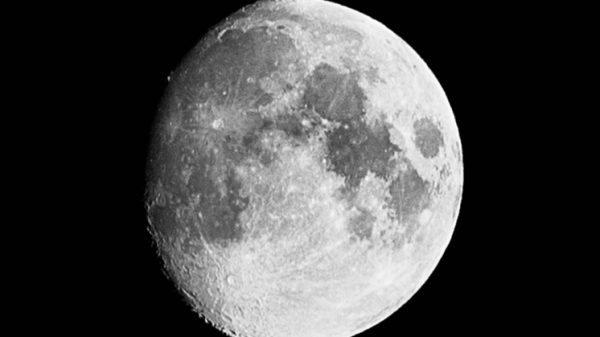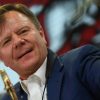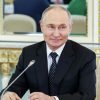 Alexey Navalny (second from right) with Natalya Vasilyeva (far right) Photo: ALEXANDER ZEMLYANICHENKO/AP
Alexey Navalny (second from right) with Natalya Vasilyeva (far right) Photo: ALEXANDER ZEMLYANICHENKO/AP
“Natalia, every time, when we meet you ask the same thing: “What will happen to Russia?”
These are the words that Alexey Navalny told me during an interview in his office in Moscow in 2016, one of at least I spent at least six with the opposition leader while he was a free man.
Navalny has always been the opposite of Vladimir Putin, the man he fought against for most of his life—witty, charming and driven by a deep moral core.
Even though it was my job to remain impartial, his good nature often got the better of me.
I first met Alexey almost 14 years ago, when he was using minuscule stakes in several state-owned Russian companies to call for greater corporate transparency. It was the start of his anti-corruption career, which has reached incredible heights under Putin.
On a winter day in 2010, he invited me, a young business reporter for the Associated Press, to Moscow. , in a one-room office above the busy Moscow highway. He had a modest legal practice, and activism was a hobby.
 Navalny and Natalya Vasilyeva in 2017
Navalny and Natalya Vasilyeva in 2017
As soon as we started talking about abuses in the shadow state oil company Surgutneftegaz, he jumped to the board and started drawing graphs and diagrams showing how much taxpayer money was being stolen.
Navalny was captivated. about what he was doing and sought to attract others to him. He was upset when I had to decline an invitation to attend a court hearing he was due to attend shortly. Nevertheless, as we left, he waved goodbye to us from the window.
Less than two years later, Navalny was no longer contactable: by December 2011, he had become a promising leader of the Russian opposition movement and was overwhelmed requests in the media.
 Navalny talks with colleagues after a live broadcast at the office of the Anti-Corruption Foundation in 2017 Photo: PAVEL GOLOVKIN/AP
Navalny talks with colleagues after a live broadcast at the office of the Anti-Corruption Foundation in 2017 Photo: PAVEL GOLOVKIN/AP
On stage his presence was magnetic. That winter, wearing several layers of thermal underwear, I stood in Moscow's central square along with some 200,000 other people who had taken to the streets to protest the rigged 2011 parliamentary elections. Several speakers denounced Putin, then prime minister and nominally deputy leader, and called for a new vote. But it was only when Navalny, then 34, began to speak that the crowd was transformed.
Refusing to wear a hat in -20 degrees, he roared: “I see enough people to storm the Kremlin right now, but we are peaceful people, we are not going to do this right now, but if these thieves and crooks continue to lie to us and steal from us, we will take back what is ours!
In retrospect, the months-long wave of protests was a turning point for Russia—one that could have stopped its descent into autocracy.
Navalny refused to call for violence. Instead, he found himself struggling to fit into the sanitized political landscape created by the Kremlin.
 Navalny in court in 2017 year during one of the many skirmishes with the Russian authorities Photo: EVGENIN FELDMAN/AP
Navalny in court in 2017 year during one of the many skirmishes with the Russian authorities Photo: EVGENIN FELDMAN/AP
While others remained within acceptable opposition, he became bolder. It became clear that he was a real headache for Putin because, unlike the Russian president, he could lay claim to real followers.
I remember his allies bursting into tears when he was handcuffed and taken away to prison. court hearing in 2013 — but was released only 24 hours after tens of thousands of people blocked the central streets of Moscow in protest.
That summer, Navalny ran for mayor of Moscow and came in second, a nasty blow for the Kremlin. They never allowed him to appear on the ballot again.
In early 2014, Putin launched an operation to annex Crimea while simultaneously sending covert Russian troops into eastern Ukraine to foment a separatist insurgency.
In the year that followed, Navalny struggled to remain relevant as Putin's revanchist policies and annexation of Crimea briefly won over the public.
When I went to interview Navalny in the spring of 2015, he was under house arrest at his home on the outskirts of Moscow, in a bleak and polluted area that seemed a world away from the luxurious lifestyle of the Russian elite.
When he opened door, he apologized that he couldn’t go outside: his tracking bracelet would go crazy if he stepped even a foot over the threshold.
Being a born troublemaker, Navalny was clearly bored sitting at home all these weeks: one day his wife Yulia came into their kitchen to joke about his restlessness.
 Navalny speaks at an anti-Putin opposition rally on Pushkin Square in Moscow in March 2012. Photo: KONSTANTIN ZAVRAZHIN/GETTY
Navalny speaks at an anti-Putin opposition rally on Pushkin Square in Moscow in March 2012. Photo: KONSTANTIN ZAVRAZHIN/GETTY
Soon the euphoria over the bloodless annexation of the Crimean peninsula wore off, and Navalny managed to reinvent himself again. His team redoubled its efforts to investigate high-level corruption and began packaging them into easy-to-read YouTube videos. One of them, an hour-long investigation into Russian Prime Minister Dmitry Medvedev, received more than 46 million views and sparked a summer of opposition protests.
As Russia jailed more dissidents and some died under suspicious circumstances, Navalny remained steadfast. He continued to support the network of allies he built across the country after the Kremlin banned him from running in the 2018 presidential election. During one of these trips to the regions of Russia, he suddenly fell ill and almost died — he was poisoned by FSB officers. While he was recovering in Germany, his allies warned him about returning to Russia.
But on a January day in 2021, he boarded a plane and arrived in Moscow, where he was arrested at passport control.
p> p>
As he was being treated for poisoning in Germany, Navalny was put on trial for violating parole conditions — a typical example of Kremlin gangsterism. He stood in the glass cage of the accused in the new courthouse in Moscow, showing defiance and making heartfelt signs to his wife. That was the last time journalists, including me, saw him.
In my interviews with Navalny over the years — in his office, in his apartment, during the filming of a YouTube video or during the election campaign — I often asked him about his future and the future of Russian democracy.
He remained in a good mood on these topics because his convictions were unshakable: Navalny sincerely believed that Russia was “no worse than other countries” and was not doomed to live in an autocracy. As for his own future, Navalny rejected the risks, saying that it was his choice to fight for the “beautiful Russia of the future” and that “sitting at home and doing nothing” was not an option.
Navalny’s optimism was sincere and contagious. This is probably why his entire family, his wife and two children, unwaveringly supported him, even when he decided to return to Russia.
He believed in the power of personal example.
“I am not afraid — and you shouldn’t either,” he scribbled on a piece of paper and showed it to the cameras standing inside the defendants’ glass cage in the winter of 2021. Even in the Arctic colony where he was sent, he maintained the same disobedience. This is what made him still dangerous for Putin. It seems the only way to break his spirit is to kill him.
























































Свежие комментарии